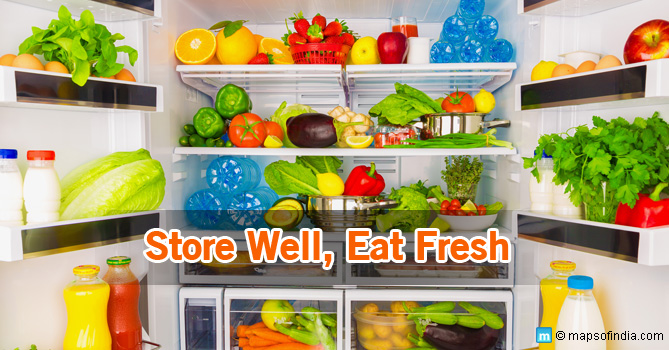Many a times we see that fruits and vegetables even when kept in the refrigerator become stale and rotten after a week or so. We usually blame it on the vendor for selling to us old stocked-up vegetables. But that is not always the case. It is mostly due to improper storage that fruits and veggies tend to go dry or stale easily. All food items need to be stored in a proper manner so as to retain their inherent properties. This becomes all the more important when you are storing multiple things in the refrigerator.
Why do fruits and vegetables get spoiled in the refrigerator?
There are two main causes for this.
- Either the food items produce ethylene gas or they are sensitive to ethylene gas. Either ways, these get spoiled when they come in contact with each other.
The fruits that give out ethylene gas are apples, apricots, bananas (ripe), avocados, blueberries, cranberries, figs, guavas, grapes, kiwi, mangoes, peaches, pears, plums, prunes etc. Among vegetables, the most common ones are papaya, potato and tomato. Leafy vegetables and fresh peas, on the other hand, are most sensitive to ethylene gas. Other items sensitive to ethylene gas are broccoli, cabbage, carrots, cauliflower, cucumbers, eggplant, garlic, beans, kale, lady’s fingers, onions, spinach, squash, strawberries, sweet potatoes, and watermelon.
- Too much cold inside the refrigerator can also spoil fruits and vegetables.
This is why packaging and storing of fruits and vegetables play an important role when kept in the refrigerator.
Here are some tips on how to keep fruits and vegetables fresh:
Packing them right
- Make use of perforated plastic bags to store the items. You can use normal plastic bags and make them perforated by punching holes in it with a fork or any sharp object.
- Brown paper bags can be used.
- You can also wrap veggies and fruits in paper towels.
- Air-tight containers or open trays, too, is a good option.
Storage ideas
- Fruits and vegetables should be kept separate. Some fruits and vegetables give out ethylene gas, which can make the other items that are sensitive to ethylene gas to ripen and rot faster, causing spoilage. All these items need to be stored in separate plastic bags.
- Except for herbs and lettuce, you can store nearly all fruits and vegetables on sheet trays in the freezer for a few days. Chop these fruits and veggies and freeze them. After a few days, place the frozen pieces in air-tight containers for use later.
Some specific vegetables
- You can store carrots, beets, and radishes in the refrigerator separately in plastic bags. Separate the leaves from the roots before storing.
- Mushrooms, Okra: Should be kept unwashed in paper bags.
- Broccoli & Cauliflower: Broccoli and cauliflower are best kept in separate drawers in the refrigerator away from other products.
- Peas: Should be stored in plastic bags.
- Cucumbers: Do not keep cucumbers in the fridge for more than three days. Keep in the front of the shelf, where temperatures are warmer. Wrap in paper towels inside the plastic bag.
Leafy green vegetables
- Wrap your leafy green vegetables in paper towels or paper and put them in plastic bags.
- Remove the rotten leaves from the bunch before storing.
- Keep different varieties in separate bags.
Some specific fruits
- Apples: Apples can be stored in the refrigerator separately in a plastic bag or a cool dark location for up to four months.
- Avocados: Ripen at room temperature first and then store in the refrigerator.
- Berries: All kinds of berries should be kept dried in covered containers in the fridge.
- Cherries & Grapes: These should be stored unwashed in plastic air-tight containers or plastic bags.
- Citrus fruits: These can be stored in the crisper drawer or in a mesh bag in the refrigerator.
- Melons: Keep cut melons in the fridge.
Herbs
- To keep herbs fresh for a longer time, wash them first, dry them, cut off the ends. Put the entire bunch in a glass of water like you do with flowers. Cover the top portion with a plastic bag or damp paper towel. This will absorb the moisture.
- You can also keep the washed and dried herbs in a plastic bag, with a paper towel inside the bag to absorb extra moisture.
What not to keep in the refrigerator?
- The refrigerator is not always the best place for many food items. For instance potatoes, sweet potatoes, onions, garlic, grapefruit, limes, lemons, tomatoes, winter squashes, mangoes and oranges remain best when stored at room temperature.
- Raw mangoes, plums, peaches and pears can be ripened at room temperature when kept in a brown bag. When these ripen, these can be kept in the fridge.





